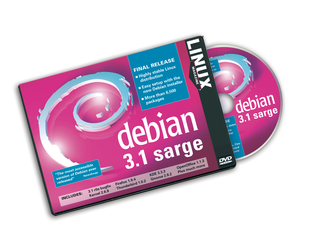
Dozens of distros grace the pages of the Internet, and yet, the world knows there is only one Debian. The much-respected Debian GNU/Linux serves a special role in the Linux pantheon because of its size, its scope, and its active social conscience. The Debian distribution exceeds the size, power, and stability of the major commercial distros, yet Debian is free, non-profit, and all volunteer.
Linux experts have used Debian for years, but the no-frills installation scheme offered few concessions for beginners. Now with the arrival of Debian 3.1, Debian at last has a system that is accessible to everyone. With a new installer, an array of useful desktop applications, and one of the best package management systems available anywhere, Debian GNU/Linux is ready for a whole new audience. We're proud to bring you Debian 3.1 "Sarge" on this month's Linux Magazine DVD.
The biggest change with Debian 3.1, and perhaps the biggest reason why this Debian is poised to reach a new generation of users, is the arrival of the Debian installer. The installer provides easy setup and configuration of your Debian system. Installation options appear in convenient menu format. Behind the scenes, the Debian installer delivers improved disk management and hardware detection. Debian leverages the power of its superb package system to install packages quickly, easily, and reliably from within the installer. The installer also offers advanced options, such as booting from a USB flash device. You can even configure RAID or logical volume management from the Debian installer.
Debian's package management system is a fast and convenient means for installing and updating software on your system. You typically only need to type a single command in order to install a new application. If you prefer a GUI, you can manage packages through the intuitive Synaptic front end. Debian's package tools automatically obtain the necessary files from sources on the Internet and manage any dependencies. Recent releases of other Linux distros have unveiled similar package systems - some derived from the Debian system and some modeled on it - but Debian's system remains the simplest and most efficient means for installing new software on Linux. According to the Debian Project, the entire Debian system can even be "upgraded in place without reformatting, without losing custom configuration files, and (in most cases) without rebooting the system."
This month's Linux Magazine DVD contains over 6,500 packages, representing the contents of seven Debian installation CDs. Once your system is up and running, you'll have access to the rest of Debian through Debian's package management system. In all, the vast Debian distribution includes over 15,000 packages.
If you choose Debian, you'll be part of a huge community of users, bloggers, admins, and developers. Help is never far from the Debian user. The Debian community is a network of over 1,600 volunteers who are motivated and personally invested in Debian's success.
And Debian is not only deep - it is also wide. The official Debian 3.1 release supports 11 different hardware architectures. (This DVD is only for the Intel i386 architecture.) The broad scope of hardware support provided by Debian is an important reason why Debian is a popular choice for users who work with a diverse range of hardware platforms.
There has never been a better time to try Debian GNU/Linux. Brand new Debian 3.1 is the easiest, friendliest Debian yet, and the handy single-DVD format makes this DVD even more convenient. Now you can try the long-awaited Debian Sarge without delivery charges or lengthy downloads. Just plug in this month's Linux Magazine DVD, and take your own tour of the powerful Debian GNU/Linux 3.1.
| Debian Social Contract |
|
The Debian community is guided by a social contract - a set of principles that form a framework for decisions. The role of the Debian distribution is clearly defined in the Debian social contract. For a full description of the social contract, see http://www.debian.org/social_contract. In a nutshell, the contract states:
|
| Debian 3.1 Sarge Highlights |
|
Linux kernel 2.4.27 / 2.6.8 XFree86 4.3.0 KDE 3.3 Gnome 2.8 OpenOffice 1.1.3 Firefox 1.0.4 GIMP 2.2.6 Apache 1.3.33 Samba 3.0.14 GCC 3.3 |